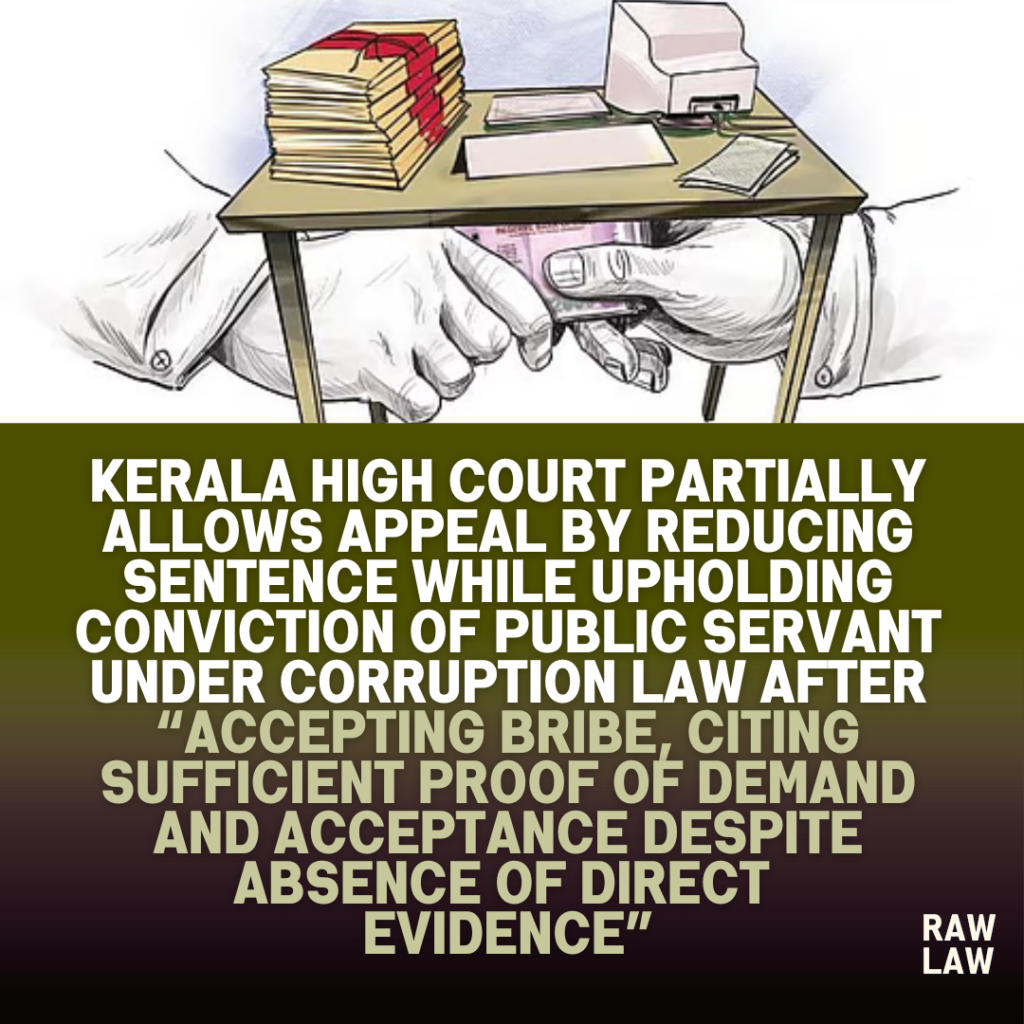Court’s Decision
The Kerala High Court partly allowed the criminal appeal by modifying the sentence but upheld the conviction of the appellant, a public servant, under Sections 7 and 13(1)(d) read with Section 13(2) of the Prevention of Corruption Act, 1988. The Court found sufficient circumstantial evidence to prove the demand and acceptance of illegal gratification and refused to interfere with the conviction. However, considering the advanced age and health condition of the accused, the Court reduced the imprisonment sentence to three months and two months under respective sections while retaining the fines imposed.
Facts
The appellant, a medical officer at a Community Health Centre, was convicted by the Special Court, Kozhikode, for accepting illegal gratification of ₹250 from a patient in return for facilitating his discharge from the hospital. The complainant alleged that the appellant demanded ₹250, accepted ₹100 on one day, and then ₹150 on a subsequent day. A trap was laid by the Vigilance Department, leading to the recovery of tainted notes. The appellant challenged the conviction, arguing insufficiency of evidence and procedural lapses in the trap operation.
Issues
- Whether the trial court rightly convicted the appellant based on circumstantial evidence of demand and acceptance of bribe.
- Whether procedural lapses and inconsistencies in evidence invalidated the prosecution’s case.
- Whether the sentence imposed warranted reduction in light of mitigating factors like age and illness.
Petitioner’s Arguments
The appellant contended that there was no credible evidence of actual acceptance of bribe. It was argued that the complainant placed money on the teapoy without direct acceptance by the appellant. The defence highlighted discrepancies in the phenolphthalein test, especially absence of solution during trial, and inconsistencies in the testimony of prosecution witnesses. Citing age and health issues, the appellant prayed for acquittal or substantial sentence reduction.
Respondent’s Arguments
The prosecution submitted that the demand and acceptance were clearly established through the complainant’s testimony corroborated by official witnesses. They argued that physical recovery of tainted currency, the positive chemical test indicating handling of bribe money, and corroborative evidence were sufficient to uphold conviction under the Prevention of Corruption Act.
Analysis of the Law
The Court reiterated that proof of both demand and acceptance is essential for conviction under Section 7 of the Prevention of Corruption Act, which can be established via direct or circumstantial evidence. The Court referred to the statutory definitions under Sections 7 and 13(1)(d) and analysed judicial precedents holding that positive phenolphthalein tests and credible testimonies can establish the offence despite lack of direct handover evidence.
Precedent Analysis
The Court referred to the judgments in Bharat Raj Meena v. CBI (2024), Neeraj Dutta v. State (2023), and Jagtar Singh v. State of Punjab (2023), all affirming that demand and acceptance can be proved circumstantially. The Court applied these rulings to uphold conviction, rejecting the defence’s plea for acquittal. However, it considered mitigating circumstances while modifying the sentence.
Court’s Reasoning
The Court found the demand and acceptance sufficiently proved through the complainant’s testimony, corroborating official evidence, and chemical tests. While procedural irregularities were noted, they did not undermine the overall prosecution case. Given the appellant’s age and health, the Court opted to reduce the quantum of imprisonment, balancing the interests of justice and deterrence.
Conclusion
The High Court dismissed the prayer for acquittal, upheld conviction under Sections 7 and 13(1)(d) of the Prevention of Corruption Act, and reduced the sentence to three months and two months respectively, with fines of ₹1,000 each. The Court directed the accused to surrender and serve the modified sentence.
Implications
The judgment reaffirms the principle that circumstantial evidence suffices to convict public servants for corruption where demand and acceptance are evident. It also shows judicial leniency in sentencing for aged or ill convicts while maintaining deterrence against corruption.
Referred Judgments Summary
- Bharat Raj Meena (2024): Reiterated requirement of proving demand and acceptance, even through circumstantial evidence.
- Neeraj Dutta (2023), Jagtar Singh (2023): Affirmed that circumstantial proof can establish offences under the Prevention of Corruption Act despite a lack of direct evidence.
FAQs
1. Can a conviction under corruption laws be based solely on circumstantial evidence?
Yes, as per Supreme Court precedents, demand and acceptance of bribe can be proved circumstantially, especially via positive chemical tests and corroborative witness testimonies.
2. Will minor procedural lapses in trap proceedings lead to acquittal?
No, unless the lapses fundamentally undermine the prosecution’s case, courts uphold conviction based on overall credible evidence.
3. Can sentence be reduced due to old age or illness of the convict?
Yes, courts often reduce imprisonment duration considering age or health issues but uphold conviction to maintain deterrence.



